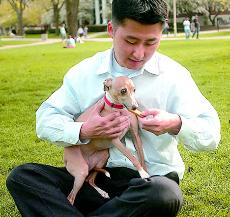Area company offers healthy dog treats

Davyd W. Chung Ph.D., CEO of the CiboReale Premium Dog Biscuit company, feeds Isabella one of the nutritious products. Isabella, an Italian greyhound, is known as the company mascot because CiboReale means “royal food” in Italian. The company is located i Suzanne Stelmasek
Apr 20, 2006
In recent years, companies traditionally known for making human-use products have begun catering to a different breed.
Pet owners spent $36 million on their furry friends in 2005, prompting big name companies like Paul Mitchell, Origins, Harley Davidson and Old Navy to offer lines of pet products such as dog shampoo, pet attire, treats and food according to American Pet Products Manufacturers Association.
A new company called CiboR‚ale, which is based in Champaign, joined these companies when it launched Monday.
CiboR‚ale’s Chief Executive Officer Davyd Chung said the company offers nutritional products for canine preventative health.
The three different types of dog biscuits in the product line are each enriched with different nutritional elements to target common canine health problems. “ABC” helps with joint ache, bone health and cardiovascular health, while “GI” benefits gastrointestinal health. “Y” is a special formula for young dogs to enhance their immune system and prevent aging.
Get The Daily Illini in your inbox!
“We only use ingredients approved by the FDA for humans,” Chung said. “Our goal is to use nutrition that has proven to be good for humans to prevent certain health problems in dogs.”
Three of the top 100 young scientists in the world are on the team that worked to develop CiboR‚ale, Chung said. One of those scientists is Dhiraj Vattem, professor of nutritional biomedicine and biotechnology at Texas State University and affiliate faculty for NASA’s Food Technology Commercial Space Center.
According to previous pawster.com posts, Vattem is a leader in the field of phytochemical research. Phytochemicals are plant chemicals that have protective or disease-preventive properties. Plants produce these chemicals to protect themselves, but recent research demonstrates that many phytochemicals can protect humans against diseases.
“It is absolutely essential to start incorporating this knowledge we have into the way we treat pets because the same diseases that exist in humans, exist in dogs,” Vattem said.
Recently, there has been growth in the development of functional foods for humans but not for pets, he added.
“People treat their pets like their kids,” Chung said. “Of course they want to ensure that their kids are healthy and taken care of.”
Heidi Quinn, sophomore in ACES, said she considers her dog a part of the family.
Her dog, which is now considered a senior at 10-years-old, has recently had medical problems that would cost the family more than $1,000 in veterinary bills.
“We just couldn’t do it,” Quinn said. “He’s on pain-killers now to help him stay comfortable while the problem, hopefully, heals on its own.”
She said she believes that before her family began caring for her dog, he developed certain eating habits that have most likely contributed to the weight and health issues he has now.
“If I could start over with my dog as a puppy, I would do everything I could to make sure he was getting the right nutrition,” she said. “Just a preventative thing, the better you take care of your pet, the more years you’ll have to enjoy their company.”





